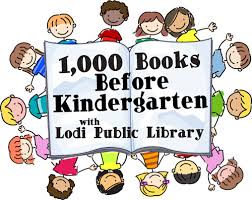Do-It-Yourself Program Ideas – 1,000 Books Before Kindergarten
1,000 Books Before Kindergarten
This month’s column is somewhat out of the ordinary; usually we offer outlines of craft and game programs based on a theme. But this month, we want to celebrate a new programming idea that should be on every public library’s agenda for 2016 – 1,000 Books Before Kindergarten.
There is a plethora of data showing that a child who is read to on a regular basis enters kindergarten with the emergent literacy skills necessary to learn to read. Those children who haven’t been read to have a much more difficult time learning how to read, which of course makes school a challenge, and remedial reading efforts take up a large part of a school district’s budget.
A recent study demonstrated that a child who is read to has a much larger vocabulary than a child who hasn’t been read to often. Nicknamed “the Word Gap,” a child’s economic status has a great deal to do with how many words the child knows. But reading to a child who is in a lower income bracket can level the playing field (www.naeyc.org/tyc/article/the-word-gap).
For a century, library storytimes have helped children learn to love books and reading, and helped preschoolers gain skills and increase their vocabularies so they will be ready for kindergarten. This includes the many children who come from households that speak English as a second language –library storytimes help them acquire English skills and well as emergent literacy skills.
One way to extend the benefits of library storytime is to encourage reading at home. Librarians are doing this with a new reading incentive program called 1,000 Books before Kindergarten. In some ways, it is like a summer reading program for preschoolers, but it is offered all year long. The parent or caregiver and child pick up a reading log from the library, and keep track of the books they read at home. The concept is to insure that children have had 1,000 books read to each of them by the time they enter kindergarten, so they are ready to learn to read.
For this program, the rewards can be very simple, such as a sticker for every 100 books read. Some libraries have received grants so they can give one new paperback picture book for every 100 books read, or a canvas book bag after the first 100 books read, as an incentive to continue. What is just as valuable as a sticker or a book bag is a diploma given to celebrate the completion of the program, which a child can show to his or her kindergarten teacher the first week of class.
When families join this program, it offers an opportunity to talk to the adults about reading to their children. You can suggest books to read based on the child’s age and interests. Remind parents that they can re-read a favorite book and mark it on the log more than once. As mentioned above, there is abundant data that confirms that a young child who is read to often before they begin kindergarten will be ready to learn to read due to the many preliteracy skills obtained by being read to as a toddler or preschooler. So this program can be vital in a child’s preparation for school
Of course, there is the added bonus that the 1,000 Books before Kindergarten program will increase library circulation, add more card holders, and increase library use in general. And library staff members have noticed the program doesn’t take that much work compared to other types of programming; many have compared it to passive craft programs where we offer the materials but the family really does most of the program. Since it is an open-ended, self-paced program, very little staff time is needed.
For more information about offering this program, check out these resources:
- A webinar and other resources provided by the program’s originator, Sandy Krost of the Bremen Public Library, Indiana can be found at cde.state.co.us/cdelib/LibraryDevelopment/YouthServices/1000Books.htm.
- Librarian Marge Loch-Wouters of La Crosse, Wisconsin, has collected materials from various 1000 books programs at pinterest.com/lochwouters/let-1000-books-bloom/.
- Another helpful resource can be found on the San Diego County Library’s website sdcl.org/1000books/, which offers information in Spanish as well as English
- Demco held a useful webinar on the subject, featuring Marge Loch-Wouters. Here are the materials from that webinar: http://ideas.demco.com/webinar/1000-books-before-kindergarten-diy/?sp_rid=MTY4MzY4NDk3MDQ0S0&sp_mid=49881483&spMailingID=49881483&spUserID=MTY4MzY4NDk3MDQ0S0&spJobID=783943548&spReportId=NzgzOTQzNTQ4S0
Penny Peck, SJSU iSchool
Leave a Reply